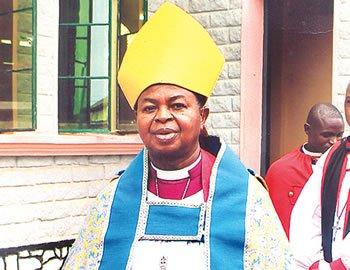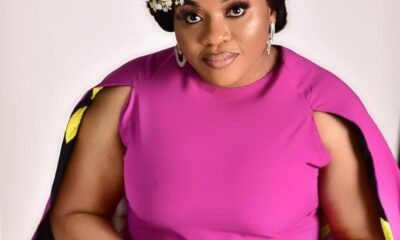
Bishop of the Church of Nigeria, Anglican Communion, Ilesa Diocese, Osun State, Right Reverend (Dr) Olubayo Sowale, in this interview with OLAIDE SOKOYA, speaks on his journey into God’s vineyard, how Nigeria can move beyond the present economic challenges and what the future holds for his diocese. Excerpts:
Looking at your background, how did you find yourself in the ministry?
I was born on 27th December, 1951, at Isara Remo, Ogun State, to the family of Pa Lamidi Sowale and Madam Abigail Sowale. I grew up in the village with my parents who were Muslims. My father was a farmer while my mother was a petty trader. I had the opportunity to be educated under the Chief Obafemi Awolowo free education programme. After school, I worked with two companies, I started as a clerk at an insurance company and became branch manager. In the process, late Reverend Canon Emmanuel Adesanya Olubogun, who was my church district chairman, saw me in the choir and as a result of that, he wanted me to live with him and promised to get me a teaching job. Without seeking my opinion, he forced me to take the catechist course in Akure, Ondo State, but I was still working with the insurance company then. I was saving my salary with Reverend Olubogun; my income then was six shillings and four pence. He wound give me only two shillings and keep the rest for me.
One day, he just called me and said I would be going to Lagos for an examination. I asked him which examination, and he said when I got to Lagos, I would know. After two weeks, I got a letter to go to Akure for an interview. I really didn’t want to become a cleric, so I kept searching for ways to disqualify myself.
When I got to Akure for the interview, we were asked to carry blocks and I blatantly refused. I returned home thinking I wouldn’t be admitted due to my disobedience. However, after a month, a letter came that I had been admitted and I was asked to pay a deposit of 50 pounds within two weeks. I kept the letter away from Reverend Olubogun because I didn’t want to go for the catechist course. After two weeks, I showed the letter to him. He took the letter without asking any question because he knew the letter had got to me earlier. He later went to St. Peter’s Church, Isara to inform them of my admission and they took the matter up and offered to pay the deposit. Later, Mr S.A. Soyinka, father of Professor Wole Soyinka, who was a relative, told my father to pay back the money so that the church would not claim they sent me to school in the future.
So, they returned the 50 pounds to the church but the church insisted on supporting me for the course and went ahead to send another 30 pounds to Akure. As a result, instead of a 50-pound deposit, I had 80 pounds as deposit for the course. When I was informed of the commitment made to the course, I was left with no choice. I spent three years in Akure, and I was later sent to Ikere Ekiti, Ondo State (now in Ekiti State) under the then Bishop of Ekiti, Right Reverend Joseph Adetiloye, who later became primate.
When he saw me, he didn’t allow me to stay because he felt I was too young. After a year, Adetiloye made sure I was admitted to Immanuel College, Ibadan, Oyo State, where I spent three years: 1974 to 1977. I went to University of Ibadan for a Bachelor’s degree in Religious Studies between 1978 and 1981. After that, I did my Masters and started my Ph.D.
By that time, I had four jobs; I was a lecturer at Immanuel College; I was also the principal of the Lay School of Evangelists at St. James Cathedral, Oke-Bola, Ibadan. I completed my PhD in 1991 and there at Immanuel College, I got married. I was appointed provost of the Cathedral Church of St Paul, Sagamu, Ogun State, where I spent seven years and I was elected as the Bishop of Ilesa in 2000.
If you were not a cleric, what would you have become?
During my secondary school days, I was a very good mathematician. Perhaps if my parents were educated, I would have been a professor. I didn’t get less than 100 per cent in mathematics. As small as I was then, my mates and seniors would come to me to solve their assignments. In fact, I want to have a foundation for indigent students who are also good in mathematics.
With your 16 years experience, what would you say are the challenges you faced?
Firstly, I would say being a bishop is different from being a priest. As a parish priest, you would enjoy the fellowship of the people. But when you become a bishop, you become lonely. People don’t want to come close to bishops; in fact, some bishops make it difficult by saying before anyone can see them, they must go through the archdeacons and this is a system I find foreign.
For this, among other reasons, I think I would still have preferred being a priest to a bishop. A bishop faces many challenges. People will misunderstand you, and some will even say you are too powerful. For instance, issues of transfer, discipline or even promotion of priests may not sit well with some people. There are so many challenges but I thank God for the wisdom given to me.
With the time you have spent here, what would you say the future holds for Ilesa diocese?
I will say the future of Ilesa Anglican Diocese is very bright. With the support of the wonderful members we have, within a short time, we built the Bishop’s Court, administrative block and a conference centre in 2009. In that same year, we created three other dioceses. We have also invested in some businesses. So, I am very hopeful for the future of this diocese.
What is the process for appointing bishops and archbishops in the Church of Nigeria Anglican Communion?
It is the duty of a bishop to prefer an archdeacon, canon, reverend, deacon or appoint the provost. The position of a bishop is occupied through election. When a bishop retires or dies, depending on which the case may be, and the seat becomes vacant in the diocese, we have what we call Bishop Advisory Committee.
It is the duty of the advisory committee to meet and state the type of person they want. They will communicate their decision to the primate who will send it to all bishops, and a nomination process takes place. Our nomination will be guided by the recommendation of the advisory committee.
An archbishop is elected from the bishops in that province. We have about 14 provinces in Nigeria.
The present administration is focused in eradicating corruption. How would you assess their performance so far?
Eradicating corruption has something in common with the church; the church preaches righteousness and justice. Where there is corruption, there will be no righteousness and justice. I once said that every human being is corrupt to a certain extent. When you deviate from doing good, you are corrupt; it may be morally, financially or socially.
So, the focus should be on all persons. There was a report recently that the president wants to re-introduce the War Against Indiscipline (WAI). Well it is part of it. The only type of corruption we deal with in Nigeria is focused on money, which is wrong. In fact, before anybody can be corrupt, he or she must have been corrupt morally. So, I support the war against corruption but it must be in all ramifications and not only with regard to stolen funds.
On a global scale, Nigeria could be said to have, arguably, the highest number of churches, yet is burdened by falling moral standards. What would you say we are not doing right?
It is really worrying. The problem is that people are deviating from the way it was in the beginning. During the advent of Christianity in 1840, when Henry Townsend and others came to Nigeria, they established churches like Anglican, Methodist and Catholic which called people to holiness and righteousness, and those values exist till today.
However, when other churches sprang up, many of them preach prosperity, without recourse to stressing that making money must be by legal means. Sin itself is rational and whoever wants to tackle sin must also be a rational being. We now have so many churches established for selfish interests. That is the reason we have high crime rate.
We also have so many Christians calling themselves born-again, yet their character is questionable. Calling yourself born-again does not eliminate wickedness. It is so unfortunate that there is no way of restricting the establishment of churches in Nigeria. So, anybody can just rise up and pronounce himself a pastor.
With the state of the nation’s economy, what would be your advice for Christians in addressing the situation?
Let all Nigerians go back to the drawing board. Unfortunately for us, we have left what we should have done and focused on oil; now the oil is failing us. Nigerians should go back to farming and apart from that, let us pray unto God.
Let us pray against all the terrorists rising against Nigeria. Finally, let us keep watch. What I have discovered is that Nigerians are very lazy; people don’t want to work. More people should embrace entrepreneurship and shift focus from monthly salary. The Lord has given us the land to till; let us make use of the land.
What would you recommend to government as solution to the current economic hardship?
The government held what was referred to as an economic summit some time ago. I will suggest that such summit should take place at the local government level.
Our government needs to go to the grassroots to educate people on how to do things; we have been treating so many things on the surface which is not right. Government should make mechanised tools available for farmers at the local level, and then you will see the difference.
They should take the opinions of the locals on how to develop the economy. Our answer is in our people and not dictating from the state houses.








